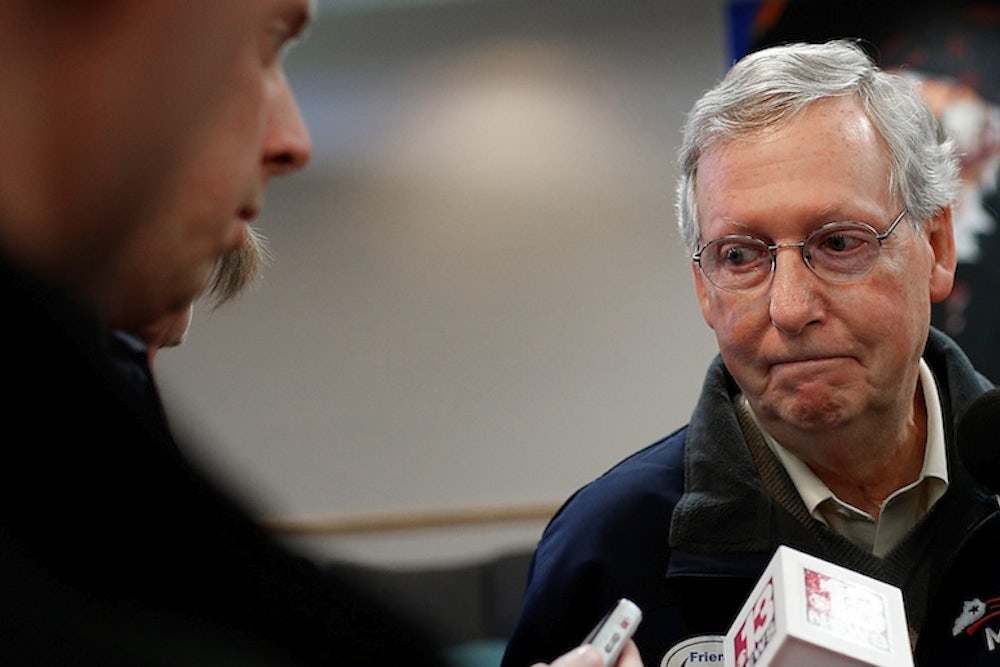Pundits are always complaining that the parties aren’t talking about big ideas and, usually, I’m the first to point out the pundits are wrong. This time, they are right.
Election Day is one week away and, thematically, both parties have very little to say. It's not hard to see why. Obama has accomplished an enormous amount in his presidency and history, I’m convinced, will assess his presidency that way. But today’s voters obviously take a different view. They tend to have negative views of the Affordable Care Act, even though they like its provisions, and they are ambivalent about a recovery that still feels weak. With so many open seats in conservative states, Democrats feel, rightly or wrongly, they can’t run too strongly on what Obama has done.
Republicans have an alternative agenda. They’d repeal Obamacare, lower taxes for the wealthy, shrink the welfare state, claw back environmental regulations and roll back reproductive rights. But the focus on the agenda is nothing like it was in 2010 or 1994, the last two elections with Republican waves, and there’s a good reason for that. Except in the most conservative states, any serious discussion of these ideas in detail would scare away the public. The buzzwords sometimes poll well, but the specifics don't.
All of this has created a sort of ideological stalemate, which Peter Suderman of Reason summed up perfectly last week: “Democrats cannot run on what they have done, and Republicans cannot run on what they will do.”
One other factor makes this election feel less meaningful: The strong possibility that change of Senate control, were it to happen, would be temporary. In 2016, virtually every seat Democrats will be defending is in the Northeast or far West—in other words, solidly blue states. Republicans, by contrast, will have to defend seats in Florida, Illinois, New Hampshire, Ohio, Pennsylvania, and Wisconsin. (You can see a full list of the senators up for re-election here.) Turnout for the presidential election will also improve Democratic prospects in 2016, plus there will have been another two years of growth for the Latino population. Anything can happen in the next two years, obviously, but most political professionals I know think Republicans will struggle to keep a majority if they get one.
This doesn’t mean the midterms lack significance. If Republicans get control of the Senate, they’ll have enough leverage to do some damage, even if they can’t override Obama’s veto. (Brian Beutler sketched out some possibilities a few weeks ago.) If Democrats pick up seats in gubernatorial races—which, like a switch is Senate control, is likely but not certain—they’ll have more influence over everything from Obamacare’s Medicaid exchanges to voting rights in the 2016 presidential election. All elections have consequences. Some are just less interesting than others.
—Jonathan Cohn
News from Monday:
EBOLA: An editorial in one of the nation's most prestigious medical journals slams governors like Christie and Cuomo for imposing 21-day quarantines, saying it is "like driving a carpet tack with a sledgehammer: it gets the job done but overall is more destructive than beneficial." (New England Journal of Medicine)
ENVIRONMENT: Last week, BP claimed its 2010 oil spill wasn't really that bad. This week, there's a published study that shows 2 of the 5 million barrels of oil that spilled are still trapped in the deep ocean. (Tim McDonnell, Mother Jones)
SEXUAL ASSAULT: MIT released the results of a campus-wide survey today that found one in six female undergraduates reported being sexually assaulted. (Svea Herbst-Bayliss, Reuters)
Articles worth reading
Vouchers to cure rare diseases: Jason Millman explains how an obscure federal program gives drug makers incentive to tackle rare diseases—but either HHS or Congress will have to act to add Ebola to the list. (Wonkblog)
Odds against us: According to the US Army, only three in ten young people ages 17 to 24 are eligible to become soldiers. As Taylor Wofford explains, seven in ten are disqualified because of their health, lack of education, or criminal records. (Time)
Lives of the 0.1 percent: Bill Ackman purchased a penthouse in New York City for $90 million, but doesn't plan to use it. Instead, he hopes to flip it for a profit in the future. Neil Irwin says it's a perfect example of how the financial industry frequently does not make the economy better off. (The Upshot)
Uber's bad math: Uber argues that its drivers in New York City make $90,766 a year on average. Alison Griswold was unable to find even one who makes that amount. (Slate)
At QED
Rebecca Leber says the chances of getting a meaningful climate change treaty next year are better than most people realize. Danny Vinik explains why the GOP is likely all talk and no action when it comes to the possibility of a proactive, Republican-majority Senate. Eric Sasson thinks we’re all overreacting to the Ebola outbreak (QED included).
Clips compiled by Claire Groden and Naomi Shavin
